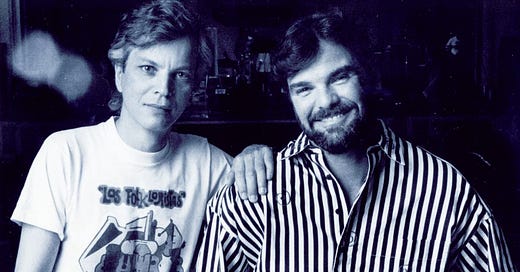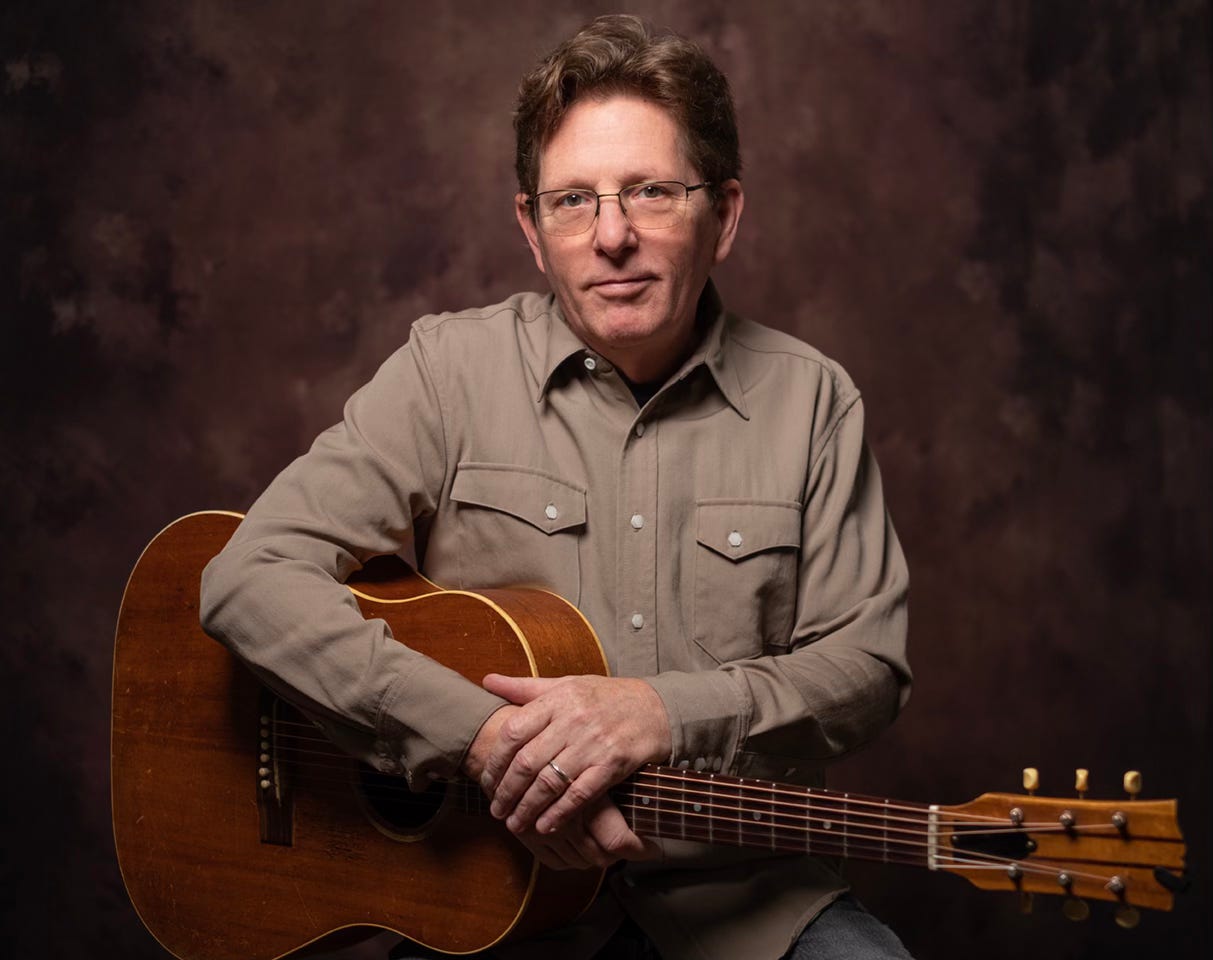Mountain Stage: An Oral History
Part 1: Origins of a radio show that started with modest means and grew quickly
With a population of just over 46,000, Charleston is West Virginia’s largest city and home to the state capital. A manufacturing hub in the middle of what was once —and to a degree still is — coal country, it also is where three major interstate systems (I-64, I-77, and I-79) converge.
The Culture Center Theater, located in downtown just off I-64 on the grounds of the State Capitol Complex, is home to a radio show — Mountain Stage — that has become an institution over the past four decades.
Now distributed on more than 280 stations nationwide by National Public Radio, the show’s modest origins started as West Virginia Public Broadcasting looked to expand from two to 13 FM stations across the state. Andy Ridenour, who worked for the state agency, was tasked with developing some new programming.
And that’s where this oral history begins.
Ridenour: When I joined West Virginia Public Broadcasting there were only two stations on the network, in Beckley and Buchanan, and the educational broadcasting authority wanted us to expand our reach statewide. We knew some new stations were coming on pretty quick, so my boss came to our staff and told us to create some programming from around the state.
Ridenour “put a pencil to paper” and over the next week developed a format — a two-hour live show that featured musicians from West Virginia who played bluegrass, classical, folk, and jazz, plus some comic elements. He then went to Francis Fisher, the show’s chief engineer, to see if it was feasible.
Ridenour: I went to Francis and said, “Can we do this?” He said yes, so we did a practice show in 1981, but we didn’t really have the equipment we needed. But we were able to make it happen, so we could see that we could do it if we could get the right equipment.
Bob Thompson (house pianist): I was playing at the Holiday Inn lounge with my jazz trio and Andy Ridenour used to come and listen to my group. He was doing the news on public radio here and thought it would be a good idea to do a live broadcast. That led to the idea to create a live radio show. I was on the pilot and then when it became a regular show in 1983, my trio was on that one, too.
The pilot also featured the Putnam County Pickers, a group that included the show’s future musical director, Ron Sowell.
Sowell: I moved here in 1974, and I’ve played in every kind of band you can imagine. Mountain Stage kind of grew up in my backyard, and one by one we became the house band. Ninety percent of the band members in this group have been bands I’ve played with before.
After the pilot, it took two years before the show could scrape up enough money to produce a monthly show. What Mountain Stage needed was a host and an artistic director. Fisher suggested Groce, a touring musician who had a novelty hit in 1976 with “Junk Food Junkie.”
Ridenour: It was Francis’ idea to bring in Larry. I didn’t think he would want to do it because he was a touring musician, but once a month was OK for him because he could still do other things and do this. That stopped when the show grew of course.
Groce: I got involved in it because I liked the other two guys (Ridenour and Fisher) who called me. They worked for West Virginia Public Radio, and I didn't. They didn’t care about the format so much, but it had to be something that wasn't expensive, and it had to be live. It wasn't just a needle drop in the studio thing. They wanted to do a show. They paid enough for me to say I would come back to West Virginia no matter where I was once a month. All I asked them was, “Instead of saying, this is a statewide show, let's say it's going to be a national show."
Ridenour: Larry is the show’s visionary. I was sort of the nuts-and-bolts guy. I would deal with booking the artists and the unions and bureaucracy.
Groce: We had no money for this, or almost no money. We had no equipment. We were strapping things together. We didn't have a mixing board. We had two small mixers we put together and Francis figured a way to rig them into one thing. We had no experience. None of us had ever done a show like this. In a way, we were perfectly naively positioned to try something that you really can't do.
Tim O’Brien and Hot Rize
Mountain Stage’s fortunes changed early on. In 1984, the show booked its first national act — Tim O’Brien and his band Hot Rize, one of the top bluegrass groups of the 1980s and ‘90s. O’Brien, who has since played on Mountain Stage more than any other artist, is a native of nearby Wheeling and his parents were fans of the show.
O’Brien: It’s funny. It just started with my mother.
Ridenour: We had done a half dozen shows and we got a letter from this woman in Wheeling asking if we’d like to have her son on the show. It was Tim. I called her and said, “Sure,” never thinking it would happen with our budget.” She gave me the number of her son’s agent and asked me to call.”
Ridenour says he had never spoken with a talent agent, but he picked up the phone.
Ridenour: I said I had spoken with Mrs. O’Brien, and that she wanted me to see if I could get Hot Rize and maybe Tim and his sister (Mollie O’Brien) and their groups to perform on our show. I told him my budget was $500 plus lodging, and there was this long pause. The agent said, “For both bands?” I told him, “Yes,” and he said he would call me back. A few minutes later, he said they wanted to do it, and that’s how our relationship started.”
O’Brien: West Virginia is all about family and looking after one another. Every time we'd play there, my mom and dad would come down from Wheeling and my mom would make chocolate chip cookies and everybody would eat them all up. They always remembered my mom. My parents were friends of the show, and I was the benefactor. I got to just be there and play.
In 1985, Hot Rize agreed to appear when Mountain Stage taped a show at the Spoleto Festival in Charleston, S.C., one of the program’s first road trips outside of West Virginia. Ridenour says that appearance helped Mountain Stage move from a statewide program to a national broadcast.
O’Brien: They said if they could get Hot Rize and a few other groups like us to play that they could broadcast live nationwide on the NPR system. That helped them, and it also helped us. We were happy to do it.
Ridenour: My boss was at a South Carolina Public Radio meeting and was talking to his counterpart down there. South Carolina was trying to bring in the Prairie Home Companion for the Spoleto Music Festival but they couldn’t afford it. My boss said our show was coming along and offered to send him a tape for them to consider us. We got Hot Rize and played the festival the next year. It was our first live national broadcast on our 25th show. That’s when NPR took notice.
Groce: I remember the first conversation Andy and I had with somebody from NPR. Frankly, they were very condescending to us and they said, ''We'll put you on, but you'll never have more than 25 or 30 stations." We thought, "Okay, whatever. You have your idea; we have our idea." That gave us more incentive.
Slow but Steady Growth
In its first decade with NPR, Mountain Stage slowly but steadily grew, reaching 100 stations nationwide by 1991. Airing live for its first 12 years, the show was one of the first to use NPR’s portable uplink satellite. But money was always tight.
Ridenour: We started out with $25,000 year for a budget, and for a long time we were doing 26 shows a year for less than $1 million. The state provided some in-kind funds and my salary wasn’t attributed toward the show’s budget, but it was always tough.
Groce: We had fun, big fun. And we always embraced the underdog part of this. I have a saying that a talking dog doesn't have to give a good speech. Nobody expects anything from you. If you do something, it's like, "Wow, that's great." Then after a while, we had prove ourselves against other people and other shows.
Even though Mountain Stage is taped in a small town and a largely rural state, Ridenour says it had an advantage in booking some acts.
Ridenour: Charleston is accessible if you’re touring. Three interstates come through there. And after a while, record companies started seeing the value of having their artists on our show. And then when you start getting artists of a certain reputation, it helps you get others regardless of whether you have the label support or not.
Groce: We've outlasted a lot of shows, and a lot of people. It's ironic that we have more carriage and cache than we’ve ever had. Usually for any show there's an arc. You go up and hit the top and then you go down. We've seen 40 years of the music business and how it changed, and we’ve changed with it. And we’re still going up.
Groce, Ridenour, and others affiliated with Mountain Stage all agree that a critical component of the show’s success is versatility and stability of the house band, a seven-piece group that features Sowell, Thompson, vocalist Julie Adams, Ryan Kenndy and Michael Lipton on electric guitar, Steve Hill on bass, and Ammed Solomon on drums.
Ridenour: They’re great musicians. Sometimes they have only 30 to 40 minutes to work a song out, but they do it every time. They’ve really raised their game over the years.
Sowell: Some shows are real tense. Sometimes there’s a lot of pressure because we don’t have much time. But for the most part, I’m surrounded by really talented, kind people. That’s the reason we’ve lasted for so long.
In 1991, Ridenour convinced Thompson to join the group as the pianist.
Ridenour: We needed a piano player, and I asked Bob if he had any interested in doing the show. He said he would do it for a year.
Thompson: Here I am, 32 years later. I’m 80 and I’m still doing it. Once I started, I just enjoyed being part of the show and I continue to enjoy it even now. Of course, it didn’t hurt that one of my first shows was R.E.M.
Coming next Wednesday: The day the #1 band in the world performed in Charleston, W.Va.
To read the additional parts of this series, click on the links below:







